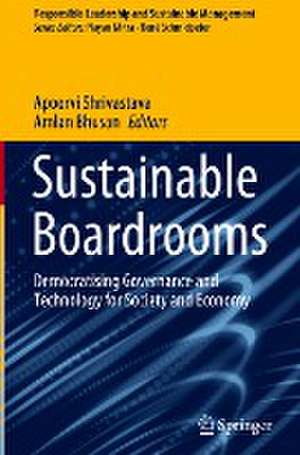Sustainable Boardrooms: Democratising Governance and Technology for Society and Economy: Responsible Leadership and Sustainable Management
Editat de Apoorvi Shrivastava, Amlan Bhusanen Limba Engleză Hardback – 16 noi 2023
This book discusses various interactions in the sustainability and development sector. It presents a thematic approach to describe progressive models and cases on disruptions, innovations, regulatory and institutional evolution related to the area of sustainability, through an organizational and boardroom level governance lens. It documents how certain schools of thought, models of engagement and methods-platforms-practices impact society and while doing so, brings together varying theoretical debates, practicing models and instruments of transformation in green governance.
Sustainable policy making demands a whole of government approach in decision-making processes. Further, inclusiveness and ‘green’ consciousness of corporate boardrooms are paramount, without which, effective socially responsible business practices are absurd. Human resource development, shaped on sustainable corporate ethics, requires well-trained sustainability specialists, managers that can think ‘green’ in their overall decision making which are essential for green governance.
In this context, the book creates a functional, interpretive repertoire of stories, commentaries, life experiences, and reflections of corporate leaders, academics, and practicing consultants, on their decision-making processes, and how they interpret sustainability. These stories and thoughts help create a functional academic construct, which will assist academics teach ‘green’ competencies to business school students better, and entrepreneurs and business executives to better understand the idea of sustainable growth.
Preț: 892.90 lei
Preț vechi: 1088.90 lei
-18% Nou
Puncte Express: 1339
Preț estimativ în valută:
170.85€ • 178.87$ • 141.37£
170.85€ • 178.87$ • 141.37£
Carte disponibilă
Livrare economică 17-31 martie
Preluare comenzi: 021 569.72.76
Specificații
ISBN-13: 9789819948369
ISBN-10: 9819948363
Pagini: 173
Ilustrații: XLII, 173 p. 25 illus., 18 illus. in color.
Dimensiuni: 155 x 235 mm
Greutate: 0.5 kg
Ediția:1st ed. 2023
Editura: Springer Nature Singapore
Colecția Springer
Seria Responsible Leadership and Sustainable Management
Locul publicării:Singapore, Singapore
ISBN-10: 9819948363
Pagini: 173
Ilustrații: XLII, 173 p. 25 illus., 18 illus. in color.
Dimensiuni: 155 x 235 mm
Greutate: 0.5 kg
Ediția:1st ed. 2023
Editura: Springer Nature Singapore
Colecția Springer
Seria Responsible Leadership and Sustainable Management
Locul publicării:Singapore, Singapore
Cuprins
Environment, social & governance norms: assessing the need for shifting focus from corporate governance to sustainable corporate governance.- An overview of ESG reporting in India: practices and challenges.- Green human resource management - a gendered approach to sustainability through women employment.- Reflections on a green economy with reference to green skills for green jobs.- Decentralizing climate action in India – lessons from global practices.- Leverage AI in green governance: potential for a climate reversal.- Traditional knowledge, sustainability, and international intellectual property law: biopiracy in patent- intensive industries.- Social credits, recognition and tax benefits for green business growth: companies demonstrating greater green governance and their social stand.- Green dispute resolution: a sustainable way of resolving disputes.
Notă biografică
Apoorvi Shrivastava is an Associate Professor, Manipal Law School, Manipal Academy of Higher Education, Bengaluru, India, and an arbitration enthusiast. She is also an accredited associate arbitrator of Chartered Institute of Arbitration (CIArb), leading professional membership organization representing the interests of alternative dispute resolution practitioners worldwide. She also runs a Centre of Alternative Dispute Resolution and propagates narrow interpretation of public policy aspect in Indian Jurisdiction. Her research interest includes corporate law, international commercial arbitration, and role of public policy in the societal norms. She is an avid supporter of green arbitration and has written numerous papers on sustainable advancement of corporate sector by tackling human rights, environmental, and labor issues. Her public–private arbitration is applauded globally. She conducts various mediation and negotiation trainings for researchers, students, and corporates to equip them in technique to resolve disputes, crack deals in amicable manner along with considering green governance principles.
Textul de pe ultima copertă
This book discusses various interactions in the sustainability and development sector. It presents a thematic approach to describe progressive models and cases on disruptions, innovations, regulatory and institutional evolution related to the area of sustainability, through an organizational and boardroom level governance lens. It documents how certain schools of thought, models of engagement and methods-platforms-practices impact society and while doing so, brings together varying theoretical debates, practicing models and instruments of transformation in green governance.
Sustainable policy making demands a whole of government approach in decision-making processes. Further, inclusiveness and ‘green’ consciousness of corporate boardrooms are paramount, without which, effective socially responsible business practices are absurd. Human resource development, shaped on sustainable corporate ethics, requires well-trained sustainability specialists, managers that can think ‘green’ in their overall decision making which are essential for green governance.
In this context, the book creates a functional, interpretive repertoire of stories, commentaries, life experiences, and reflections of corporate leaders, academics, and practicing consultants, on their decision-making processes, and how they interpret sustainability. These stories and thoughts help create a functional academic construct, which will assist academics teach ‘green’ competencies to business school students better, and entrepreneurs and business executives to better understand the idea of sustainable growth.
Caracteristici
Brings together boardroom reflections on practicing sustainability as an organizational development tool Is an interpretive repertoire which universalizes application of issues raised, appealing to different social groups Contains thoughts from corporate decision makers, senior academics, and consultants






